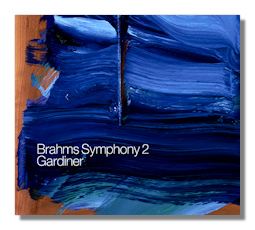
The Internet's Premier Classical Music Source
Related Links
-
Brahms Reviews
Schubert Reviews - Latest Reviews
- More Reviews
-
By Composer
-
Collections
DVD & Blu-ray
Books
Concert Reviews
Articles/Interviews
Software
Audio
Search Amazon
Recommended Links
Site News
 CD Review
CD Review
Romantic Masters

- Johannes Brahms:
- Symphony #2
- Alto Rhapsody
- Franz Schubert:
- Gesang der Geister uber den Wassern, D. 714
- Gruppe aus dem Tartarus, D. 583 (arr. Brahms)
- An Schwager Kronos, D. 369 (arr. Brahms)
Nathalie Stutzmann, contralto
Monteverdi Choir
Orchestre Révolutionnaire et Romantique/John Eliot Gardiner
Soli Deo Gloria Records SDG703
In reviewing Gardiner's reading of Brahms' Symphony #1, the first issue in this series on Soli Deo Gloria (SDG702), I wrote: "Slower tempos simply don't work in this symphony, especially in the first movement, and with Gardiner the music in the opening panel is driven, tense, filled with spirit." Amen. In the Second Symphony, however, Gardiner's first movement is relaxed and expansive, but also darker in character than what one typically finds in performances of this symphony. The question, then, some might ask is, can slower tempos work here? Well, of course, not least because the mood is epic in character and generally thought to be sunny and optimistic. Many conductors out of the past have given us moderately-paced, even quite deliberately-paced renditions of this movement in convincing style. Gardiner does so, but also by plumbing the depths of emotional expression here, unearthing much darkness, even a strong sense of bleakness.
The strings play with less vibrato throughout, often imparting a feeling of rawness, of coldness. Try the second movement: the opening is dour; the cellos, which I've generally heard in the past as warm and Romantic here, sound almost as if they're screaming in pain. When the violins take up the theme, there's hardly a break in the feeling of bleakness. While a sense of consolation and warmth eventually arrives, it doesn't substantially change the dark mood. Even the chipper third movement, paced quite briskly here, has a sense of anxiety about it.
The finale comes across with triumph in Gardiner's hands, as it should. But even here, there are moments of struggle and dark reflection, as if the triumph is hard-earned. Overall, Gardiner must be credited with presenting a most thought-provoking view of the Brahms Second. Nothing is radical in his phrasing or in the excellent playing by the Orchestre Révolutionnaire et Romantique, but the end result is, well, somewhat radical. Exposure to this recording may well change the way you think about the Brahms Second Symphony. I urge everyone who takes his or her Brahms seriously to obtain this recording. There is a probing interview with Gardiner provided in the album booklet, too, that explains much of the conductor's dark view of this work.
The fillers? The Alto Rhapsody, a splendid work by Brahms coming right after the Requiem and shortly before the First Symphony, is also dark and beautiful. It is splendidly sung here by French contralto Nathalie Stutzmann. She possesses one of the most beautiful alto voices I've ever heard, and her phrasing and sense for drama are intelligently realized. The choral singing in this work and in the three Schubert choruses is also excellent. The sound reproduction on all works is close and clear. All in all, this is a most valuable release. Urgently recommended!
Copyright © 2009, Robert Cummings




















